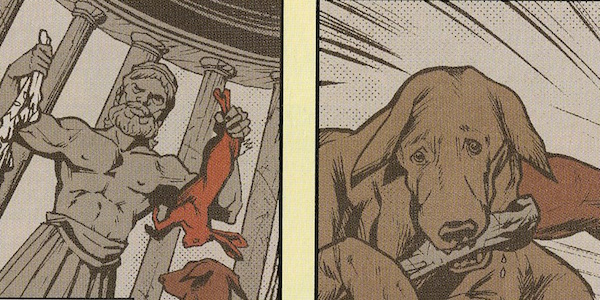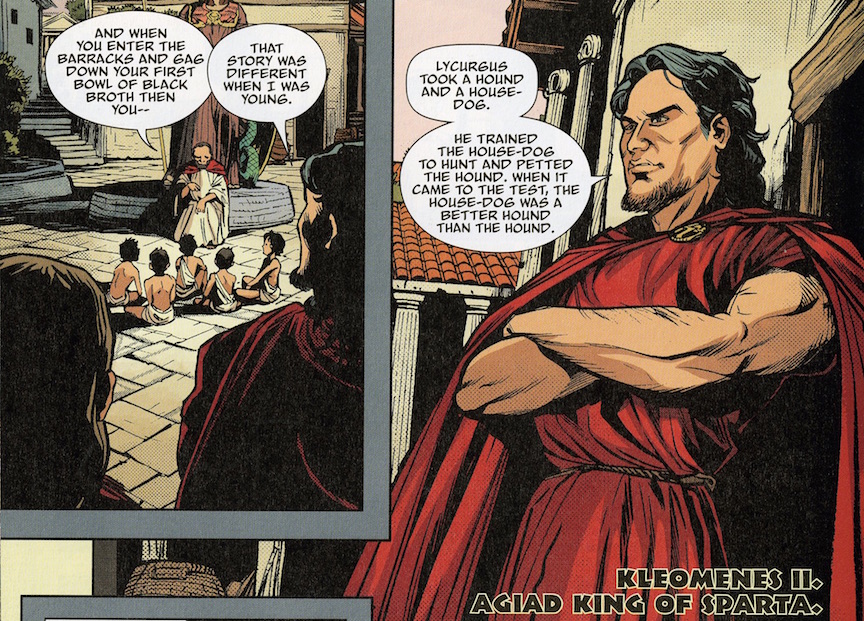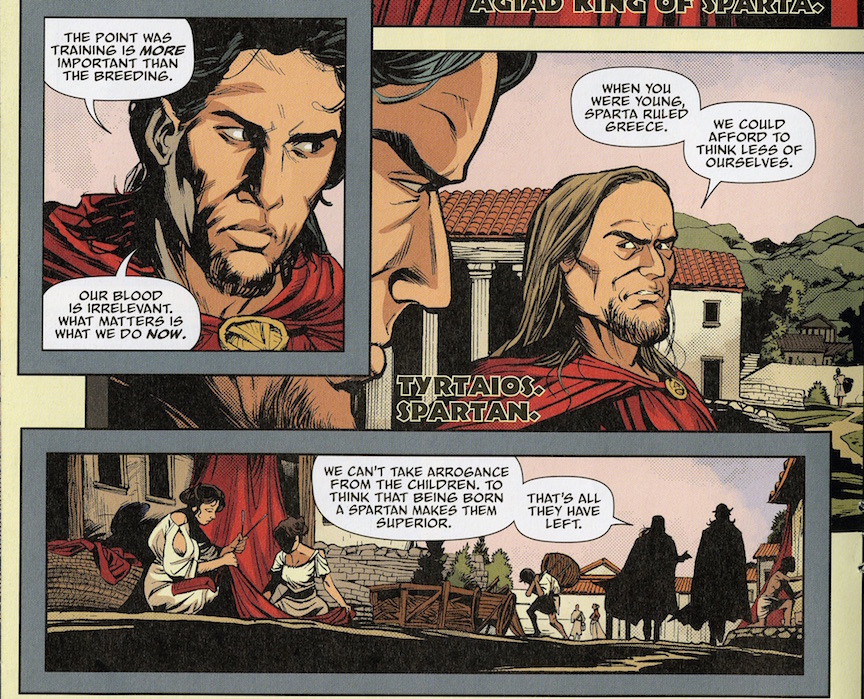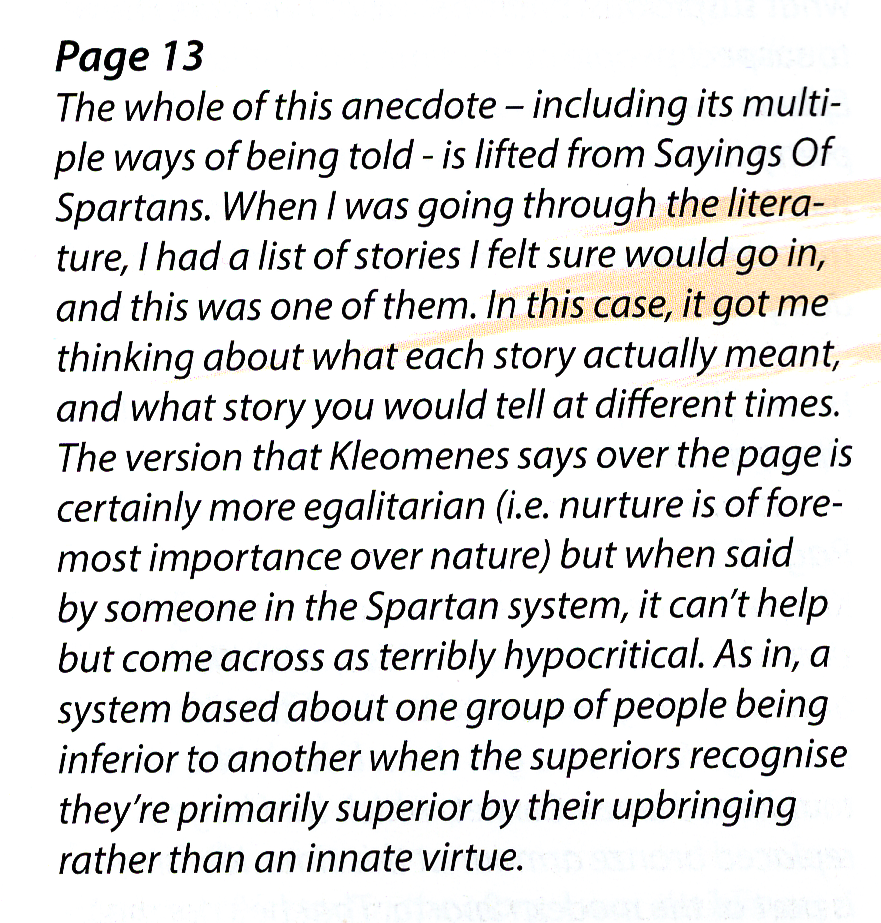
September 25, 2020, by Lynn Fotheringham
Lycurgus’ dogs, part 2
CONTENT: REFERENCES TO ANCIENT SLAVERY & TO HUNTING WITH DOGS (IN ANCIENT GREECE)
Three, by Kieron Gillen & Ryan Kelly; chapter/issue 2, cont. [For an introduction to Three, see this post; for an overview of chatper 2 see the Departmental blog.]
In the last post we saw Plutarch’s Lycurgus-and-the-two-dogs anecdote being re-used in Three as a story teaching young Spartiate boys that rigorous training is required in order to ‘become Spartan’. In Sayings of the Spartans, though, there is a twist. The text continues:
Τινὲς δὲ φασιν, ὡς οὐ παρῆγε σκύλακας, οἳ ἐκ τῶν αὐτῶν γεγονότες ἐτύγχανον, ἀλλ᾿ ὁ μὲν ἐξ οἰκουρῶν, ἕτερος δ᾿ ἐκ κυνηγετικῶν· κἄπειτα τὸν μὲν ἐκ τοῦ χείρονος γένους πρὸς τὰ κυνηγέσια ἤσκησε, τὸν δὲ ἐκ τοῦ ἀμείνονος περὶ λιχνείας μόνον εἴθισεν· εἶθ᾿ ἑκατέρου ἐφ᾿ ἃ εἴθιστο ὁρμήσαντος, φανερὸν ποιήσας ὅσον ἡ ἀγωγὴ πρὸς τὰ ἀμείνω καὶ χείρω συλλαμβάνεται, εἶπεν, “οὐκοῦν καὶ ἡμᾶς, ὦ πολῖται, οὐδὲν ἡ παρὰ τοῖς πολλοῖς θαυμαζομένη εὐγένεια καὶ τὸ ἀφ᾿ Ἡρακλέους εἶναι ὀνίνησιν, εἰ μὴ πράττομεν δι᾿ ἃ ἐκεῖνος ἁπάντων ἀνθρώπων ἐπιδοξότερος καὶ εὐγενέστερος ἐφάνη, ἀσκούμενοι καὶ μανθάνοντες καλὰ δι᾿ ὅλου τοῦ βίου.” (Sayings of the Spartans, Lycurgus 1, cont. = Moralia 225f-226a) |
But some say that he did not bring in dogs which were of the same stock, but that one was of the breed of house dogs and the other of hunting dogs; then he trained the one of inferior stock for hunting, and the one of better stock he accustomed to dainty food. And afterwards, as each made for that to which it had become accustomed, he made it clear how much instruction contributes for better or worse, saying, “So also in our case, fellow-citizens, noble birth, so admired of the multitude, and our being descended from Heracles does not bestow any advantage, unless we do the sort of things for which he was manifestly the most glorious and most noble of all mankind, and unless we practise and learn what is good our whole life long.” |
- Text and translation by Frank Cole Babbitt, Loeb Classical Library vol.245, 1931.
It is not uncommon to find slightly varying versions of an anecdote like this in different authors. The inclusion of two variants in this one text is a reminder that Plutarch was already removed from the original events/stories by several centuries, working with multiple inconsistent sources.
Back in Three, after the page-turn we view the storyteller and his audience from behind two men who are watching them. One of them, who turns out to be the young king Kleomenes II, notes that ‘That story was different when [he] was young.’ He goes on to summarise Plutarch’s second version of the anecdote.

THREE ch.2, p.14 panels 1-2
This sequence (pp.12-14) is one of my favourite moments in Three from the point of view of its relationship with the sources, because Kieron finds a way to fit in both of Plutarch’s variants, and in a way that doesn’t just show off his awareness of the complexity of our sources, but makes that complexity serve the plot of the new story.
Plutarch doesn’t say which of the two versions came first; he may not have known! So Kieron is speculating here. But Kieron has looked at the development of Spartan history and come up with a very plausible reason why the story might change at this particular point in time:

THREE ch.2, p.14 panels 3-5
Terpander’s remarks in chapter/issue 1 have already informed the reader that Sparta is no longer as powerful as it once was. These remarks reinforce that impression, and also characterise Kleomenes and his friend Tyrtaios as intelligent individuals who are thinking about Sparta’s position in the world and how it is changing. This is really intelligent and efficient incorporation of details from the genuine ancient sources into the fictional story.
I’ll leave you with Kieron’s own thoughts on the matter:

THREE, historical footnote
Next: what is this ‘black broth’ (panel 1)???
Bibliography:
Ephraim David, ‘Myth and historiography: Lykourgos’, in Greeks between East and West. Essays in Greek Literature and History in memory of David Asheri (edited by Herman & Shatzman) 2007, pp.115-135.
- The author only refers to the ‘two dogs’ story once, very briefly, but the article is a good introduction to the impossibility of disentangling historical fact from mythologising propaganda in relation to Lycurgus/Lykourgos.
NOTE: I may refer to/quote comments on this post either in later blog-posts or in a research publication. More information about my audience-research, including a Privacy Notice and ways of getting hold of the book.
Extracts from Three © 2013 Kieron Gillen & Ryan Kelly. Used with permission.
No comments yet, fill out a comment to be the first

Leave a Reply